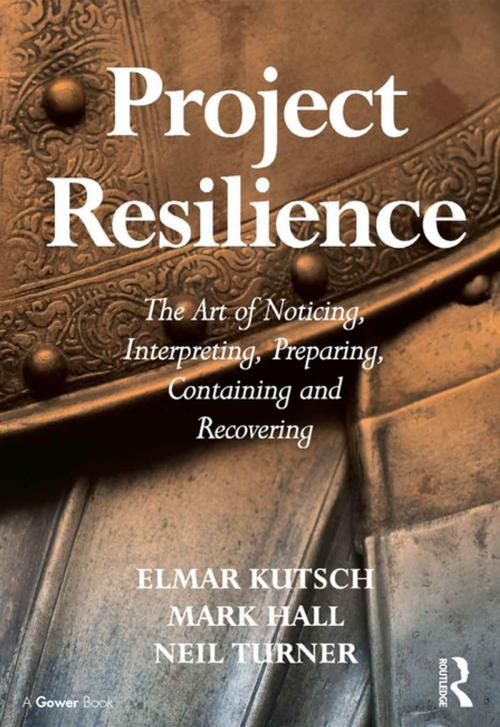Project Resilience
The Art of Noticing, Interpreting, Preparing, Containing and Recovering
Business & Finance, Industries & Professions, Insurance, Management & Leadership, Management| Author: | Elmar Kutsch, Mark Hall | ISBN: | 9781317074977 |
| Publisher: | Taylor and Francis | Publication: | March 9, 2016 |
| Imprint: | Routledge | Language: | English |
| Author: | Elmar Kutsch, Mark Hall |
| ISBN: | 9781317074977 |
| Publisher: | Taylor and Francis |
| Publication: | March 9, 2016 |
| Imprint: | Routledge |
| Language: | English |
As the title suggests, Project Resilience is about making projects and project managers more resilient. The authors look at projects not simply from a ’mechanistic’ approach in which work can be broken down, executed and controlled as a series of interlocking parts but rather as ’organic’ constructs, living entities existing for a finite period of time, consisting of people, structures and processes. These entities are constantly challenged by environmental adversity - risk, uncertainty and complexity. Resilience involves finding ways to help project managers notice more, interpret adversity more realistically, prepare themselves better for it, contain and recover from it quicker and more appropriately. The book has two purposes: it offers a glimpse into our tendencies to be irrational in the face of adversity: risk, uncertainty and complexity. The second purpose is to offer a new perspective to aid in managing risky, and in particular uncertain and complex projects. The authors go beyond commonly-accepted standards in project management with the aim of providing an understanding of how to implement project-wide resilience. The purpose is to guide, not to prescribe. It is best used as a trigger for a thinking process to define your own unique approach to managing uncertainty, not to replace your experience and judgement. Ultimately, it has been written to challenge traditional wisdom in project management, and to address the rationale for creative best practices.
As the title suggests, Project Resilience is about making projects and project managers more resilient. The authors look at projects not simply from a ’mechanistic’ approach in which work can be broken down, executed and controlled as a series of interlocking parts but rather as ’organic’ constructs, living entities existing for a finite period of time, consisting of people, structures and processes. These entities are constantly challenged by environmental adversity - risk, uncertainty and complexity. Resilience involves finding ways to help project managers notice more, interpret adversity more realistically, prepare themselves better for it, contain and recover from it quicker and more appropriately. The book has two purposes: it offers a glimpse into our tendencies to be irrational in the face of adversity: risk, uncertainty and complexity. The second purpose is to offer a new perspective to aid in managing risky, and in particular uncertain and complex projects. The authors go beyond commonly-accepted standards in project management with the aim of providing an understanding of how to implement project-wide resilience. The purpose is to guide, not to prescribe. It is best used as a trigger for a thinking process to define your own unique approach to managing uncertainty, not to replace your experience and judgement. Ultimately, it has been written to challenge traditional wisdom in project management, and to address the rationale for creative best practices.















